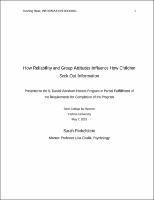Please use this identifier to cite or link to this item:
https://hdl.handle.net/20.500.12202/4468Full metadata record
| DC Field | Value | Language |
|---|---|---|
| dc.contributor.advisor | Chalik, LIsa | en_US |
| dc.contributor.author | Finkelstein, Sarah | |
| dc.date.accessioned | 2019-07-03T23:24:18Z | |
| dc.date.available | 2019-07-03T23:24:18Z | |
| dc.date.issued | 2019-05-07 | |
| dc.identifier.citation | Finkelstein, Sarah. How Reliability and Group Attitudes Influence How Children Seek Out Information Presented to the S. Daniel Abraham Honors Program in Partial Fulfillment of the Requirements for Completion of the Program Stern College for Women Yeshiva University May 7, 2019. | en_US |
| dc.identifier.uri | https://hdl.handle.net/20.500.12202/4468 | |
| dc.identifier.uri | https://ezproxy.yu.edu/login?url=https://repository.yu.edu/handle/20.500.12202/4468 | |
| dc.description | The file is restricted for YU community access only. | en_US |
| dc.description.abstract | Research has shown that children consider both past reliability and ingroup bias when deciding whom to learn new information from. For example, when 3- and 4-year-old children were shown a video in which one actor consistently labeled familiar objects correctly and the other actor consistently labeled familiar objects incorrectly, they were more likely to endorse the label for a novel object provided by the reliable actor (Koenig, et al., 2004). On the other hand, children prefer information that favors their ingroup to information that favors their outgroup (Over et al. 2017). The present study investigated whether 4- to 6-year-old children favor past reliability or ingroup bias when these two factors are pitted against one another. When choosing a story to hear, participants tended to prefer one written by an unreliable informant who favored their outgroup over one written by a reliable informant who favored their ingroup. Furthermore, children revised their intergroup attitudes in response to the story written by the reliable informant, but not the unreliable one. Implications for education and the study of social cognition are discussed. | en_US |
| dc.description.sponsorship | S. Daniel Abraham Honors Program of Stern College for Women | en_US |
| dc.language.iso | en_US | en_US |
| dc.publisher | Stern College for Women. Yeshiva University.. | en_US |
| dc.rights | Attribution-NonCommercial-NoDerivs 3.0 United States | * |
| dc.rights.uri | http://creativecommons.org/licenses/by-nc-nd/3.0/us/ | * |
| dc.subject | honors thesis | en_US |
| dc.subject | information seeking (children) | en_US |
| dc.subject | group attitudes | en_US |
| dc.title | How Reliability and Group Attitudes Influence How Children Seek Out Information. | en_US |
| dc.type | Thesis | en_US |
| Appears in Collections: | S. Daniel Abraham Honors Student Theses | |
Files in This Item:
| File | Description | Size | Format | |
|---|---|---|---|---|
| Sarah Finkelstein, Senior Project.pdf Restricted Access | submitted by HR/SCW | 401.93 kB | Adobe PDF |  View/Open |
This item is licensed under a Creative Commons License

